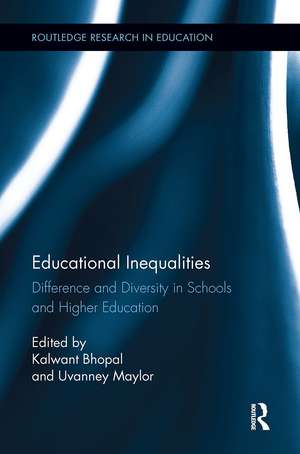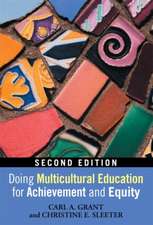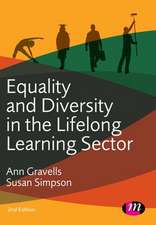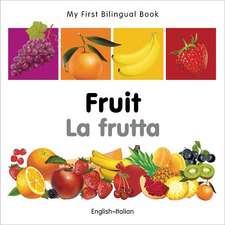Educational Inequalities: Difference and Diversity in Schools and Higher Education: Routledge Research in Education
Editat de Kalwant Bhopal, Uvanney Mayloren Limba Engleză Paperback – 14 oct 2024
| Toate formatele și edițiile | Preț | Express |
|---|---|---|
| Paperback (1) | 255.63 lei 6-8 săpt. | |
| Taylor & Francis – 14 oct 2024 | 255.63 lei 6-8 săpt. | |
| Hardback (1) | 1064.01 lei 6-8 săpt. | |
| Taylor & Francis – 29 oct 2013 | 1064.01 lei 6-8 săpt. |
Din seria Routledge Research in Education
- 8%
 Preț: 381.99 lei
Preț: 381.99 lei -
 Preț: 147.15 lei
Preț: 147.15 lei -
 Preț: 310.22 lei
Preț: 310.22 lei -
 Preț: 304.19 lei
Preț: 304.19 lei -
 Preț: 276.13 lei
Preț: 276.13 lei -
 Preț: 303.18 lei
Preț: 303.18 lei -
 Preț: 302.17 lei
Preț: 302.17 lei -
 Preț: 310.29 lei
Preț: 310.29 lei -
 Preț: 310.31 lei
Preț: 310.31 lei - 8%
 Preț: 381.60 lei
Preț: 381.60 lei -
 Preț: 401.01 lei
Preț: 401.01 lei -
 Preț: 377.85 lei
Preț: 377.85 lei -
 Preț: 303.89 lei
Preț: 303.89 lei -
 Preț: 310.65 lei
Preț: 310.65 lei -
 Preț: 303.75 lei
Preț: 303.75 lei -
 Preț: 310.08 lei
Preț: 310.08 lei -
 Preț: 290.73 lei
Preț: 290.73 lei -
 Preț: 304.83 lei
Preț: 304.83 lei -
 Preț: 129.83 lei
Preț: 129.83 lei - 9%
 Preț: 1003.95 lei
Preț: 1003.95 lei - 9%
 Preț: 867.43 lei
Preț: 867.43 lei -
 Preț: 303.89 lei
Preț: 303.89 lei -
 Preț: 358.67 lei
Preț: 358.67 lei -
 Preț: 400.72 lei
Preț: 400.72 lei -
 Preț: 397.75 lei
Preț: 397.75 lei - 18%
 Preț: 1116.74 lei
Preț: 1116.74 lei - 18%
 Preț: 1060.52 lei
Preț: 1060.52 lei - 18%
 Preț: 1110.74 lei
Preț: 1110.74 lei - 18%
 Preț: 1221.80 lei
Preț: 1221.80 lei - 18%
 Preț: 1053.92 lei
Preț: 1053.92 lei - 18%
 Preț: 1162.84 lei
Preț: 1162.84 lei - 18%
 Preț: 1063.65 lei
Preț: 1063.65 lei - 28%
 Preț: 851.82 lei
Preț: 851.82 lei - 18%
 Preț: 1054.75 lei
Preț: 1054.75 lei - 18%
 Preț: 1054.58 lei
Preț: 1054.58 lei - 18%
 Preț: 1178.85 lei
Preț: 1178.85 lei - 18%
 Preț: 1111.72 lei
Preț: 1111.72 lei - 18%
 Preț: 1057.75 lei
Preț: 1057.75 lei -
 Preț: 489.03 lei
Preț: 489.03 lei - 18%
 Preț: 1059.14 lei
Preț: 1059.14 lei - 18%
 Preț: 1050.09 lei
Preț: 1050.09 lei - 18%
 Preț: 1060.52 lei
Preț: 1060.52 lei - 18%
 Preț: 1062.98 lei
Preț: 1062.98 lei - 18%
 Preț: 1056.28 lei
Preț: 1056.28 lei - 18%
 Preț: 1217.63 lei
Preț: 1217.63 lei - 18%
 Preț: 1060.19 lei
Preț: 1060.19 lei - 18%
 Preț: 1170.84 lei
Preț: 1170.84 lei - 18%
 Preț: 1167.36 lei
Preț: 1167.36 lei - 18%
 Preț: 1113.95 lei
Preț: 1113.95 lei
Preț: 255.63 lei
Preț vechi: 297.38 lei
-14% Nou
Puncte Express: 383
Preț estimativ în valută:
48.93€ • 53.17$ • 41.13£
48.93€ • 53.17$ • 41.13£
Carte tipărită la comandă
Livrare economică 21 aprilie-05 mai
Preluare comenzi: 021 569.72.76
Specificații
ISBN-13: 9781032923031
ISBN-10: 1032923032
Pagini: 298
Dimensiuni: 152 x 229 x 20 mm
Greutate: 0.55 kg
Ediția:1
Editura: Taylor & Francis
Colecția Routledge
Seria Routledge Research in Education
Locul publicării:Oxford, United Kingdom
ISBN-10: 1032923032
Pagini: 298
Dimensiuni: 152 x 229 x 20 mm
Greutate: 0.55 kg
Ediția:1
Editura: Taylor & Francis
Colecția Routledge
Seria Routledge Research in Education
Locul publicării:Oxford, United Kingdom
Public țintă
Academic, Postgraduate, and UndergraduateCuprins
1. Educational Inequalities in Schools and Higher Education: An Introduction Kalwant Bhopal and Uvanney Maylor Part I: Difference, Diversity and Inclusion 2. Pale/Ontology: The Status of Whiteness in Education Zeus Leonardo 3. How Fair is Britain? Addressing ‘Race’ and Education Inequalities in the 21st Century Gill Crozier 4. Black Academic Success: What’s Changed? Jasmine Rhamie 5. The Intersections Of Ethnicity, Gender, Social Class And An Itinerant Lifestyle: Deconstructing Teachers’ Narratives And Thinking About The Possibilities For Transformative Action Robyn Henderson Part II: Understanding Difference: Policy and Practice in Education 6. Negotiating Achievement: Students’ Gendered and Classed Constructions of (Un) Equal Ability Anne-Sofie Nyström 7. Change AND Tradition: Muslim boys’ Talk about Their Post-16 Aspirations Farzana Shain 8. Gendered Surveillance and the Social Construction of Young Muslim Women in Schools Heidi Safia Mirza and Veena Meetoo 9. Politics of Difference, Intersectionality, Pedagogy of Poverty and Missed Opportunities at Play in the Classroom Carl A. Grant and Annemarie Ketterhagen Engdahl Part III: Educational Inequalities: Identities, Inclusion and Barriers 10. "I Want to Hear You": Listening to the Narratives, Practices and Visions of a Chuj Maya Teacher in Guatemala Alexandra Allweiss 11. What Does It Mean to be the "Pride of Pinesville"?: Opportunities Facilitated and Constrained Amy Johnson Lachuk, Mary Louise Gomez and Shameka N. Powell 12. A Place to Hang my Hat On? University Staff Perceptions in Multiethnic New Zealand Edwina Pio, Ali Rasheed, Agnes Naera, Kitea Tipuna and Lorraine Parker 13. Intersectional Pedagogy: From Movies to the Classroom Elzbieta H. Oleksy 14. Intersecting Identities: Young People’s Constructions of Identity in South-East Europe Alistair Ross 15. Conclusions Uvanney Maylor and Kalwant Bhopal
Descriere
This edited text aims to bring together researchers in the field of education located across many international contexts such as the UK, Australia, USA, New Zealand and Europe. Contributors investigate the ways in which dominant perspectives on "difference," intersectionality and institutional structures underpin and reinforce educational inequa










